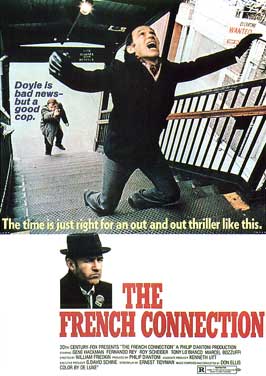Earlier today, thanks to Netflix, I watched the 1971 best picture winner, The French Connection.
Based on a true incident, The French Connection is the story of two NYPD detectives, the reasonable and serious Buddy Russo (Roy Scheider) and his far more hyperactive partner, Popeye Doyle (Gene Hackman). When we first see them, Doyle is dressed as Santa Claus and they’re both chasing a drug dealer through the streets of New York. When they eventually catch up with the dealer, Russo plays good cop while Doyle plays batshit insane cop. That’s a pattern that plays out repeatedly over the course of the film. Russo suggests caution. Doyle blindly fires his gun into the shadows. Russo is sober. Doyle is frequently drunk. Russo is careful with his words. Doyle is a casual racist who never seems to stop talking. The one thing that Russo and Doyle seem to have in common is that they’re both obsessed with catching criminals.
The French Connection is also the story of Alain Charnier (Fernando Rey), a suave and always impeccably dressed French businessman. Charnier has a plan to smuggle several millions of dollars of heroin into the United States by hiding it in a car that will be driven by an unsuspecting (and rather vacuous) French actor named Henri Devereaux (Frederic de Pasquale). Working with Charnier is a low-level mafia associate named Sal Boca (Tony Lo Bianco) and a lawyer named Joel Weinstock (Harold Gray).
(Incidentally, Weinstock’s chemist is played by an actor named Patrick McDermott, who also played Susan Sarandon’s abusive hippie boyfriend in Joe. The French Connection was McDermott’s third film and also his last. I point this out because McDermott totally steals his one scene in The French Connection. When one considers both his performance here and his work in Joe, it’s strange and unfortunate that McDermott’s cinematic career ended after just three films. According to a comment left on the imdb, he later ran a health food store in Nebraska.)
When Doyle and Russo just happen to spy Sal hanging out with a group of mobsters at a local club, they decide (mostly on a whim) to investigate what Sal’s up to. They notice that Sal drives a car that he shouldn’t be able to afford. Will they discover how Sal is making his money and will they be able to stop Charnier from smuggling his heroin into the United States?
Well…let’s just say that The French Connection was made in 1971. That’s right, this is one of those films where everything is ambiguous. Neither Russo nor Doyle are traditional heroes. Neither one of them is foolish enough to believe that their actions will make a difference. Instead, they seem to view it all as a game, with Doyle and Russo as the win-at-any-cost good guys and the French as the bad guys. And, indeed, it’s interesting to note that, when the police do make their move against Charnier, it’s the people who work for him who suffer the worst punishments.
I have to admit that, as a civil libertarian, Doyle is the type of cop who should make my skin crawl. He’s an obsessive bigot, the type who runs into the shadows with his gun drawn and blindly firing. When I watched The French Connection, a part of me wanted to get offended and say, “It’s none of your business why Sal has an expensive car!” But I didn’t. In fact, I was rooting for Doyle the whole time. The French Connection is probably one of the best cast films of all time. Hackman gives such a good performance that, while you can’t overlook Doyle’s flaws, you can accept them. Meanwhile, Rey is so sleazy and smug in the role of Charnier that you really don’t care about his rights. You just want to see him taken down.
(That said, if I ever got hold of a time machine and went back to New York in 1971, I’d rather be arrested by Russo than Doyle. Doyle seems like he’d be the type to grope while frisking.)
Seen today, it’s a bit odd to think of The French Connection as being a best picture winner. It has nothing to do with the film’s quality. The film’s performances remain strong. William Friedkin’s documentary-style direction is still compelling and he makes the decay of 1970s New York oddly beautiful. Instead, it’s the fact that The French Connection essentially tells a very simple story that, when seen today, feels very familiar. It’s a cop film and it includes every single cliché that we’ve come to associate with cop films. (Russo and Doyle even have a supervisor who yells at them for not doing things by the book.) But, what you have to realize is that the majority of those clichés were invented by The French Connection. If imitation is the sincerest form of flattery, then The French Connection is probably one of the most flattered film ever made.
And what better way to end this review than by sharing The French Connection‘s most influential scene? In the scene below, Doyle chases a commuter train that happens to be carrying one of Charnier’s associates.
Apprecier le film!
